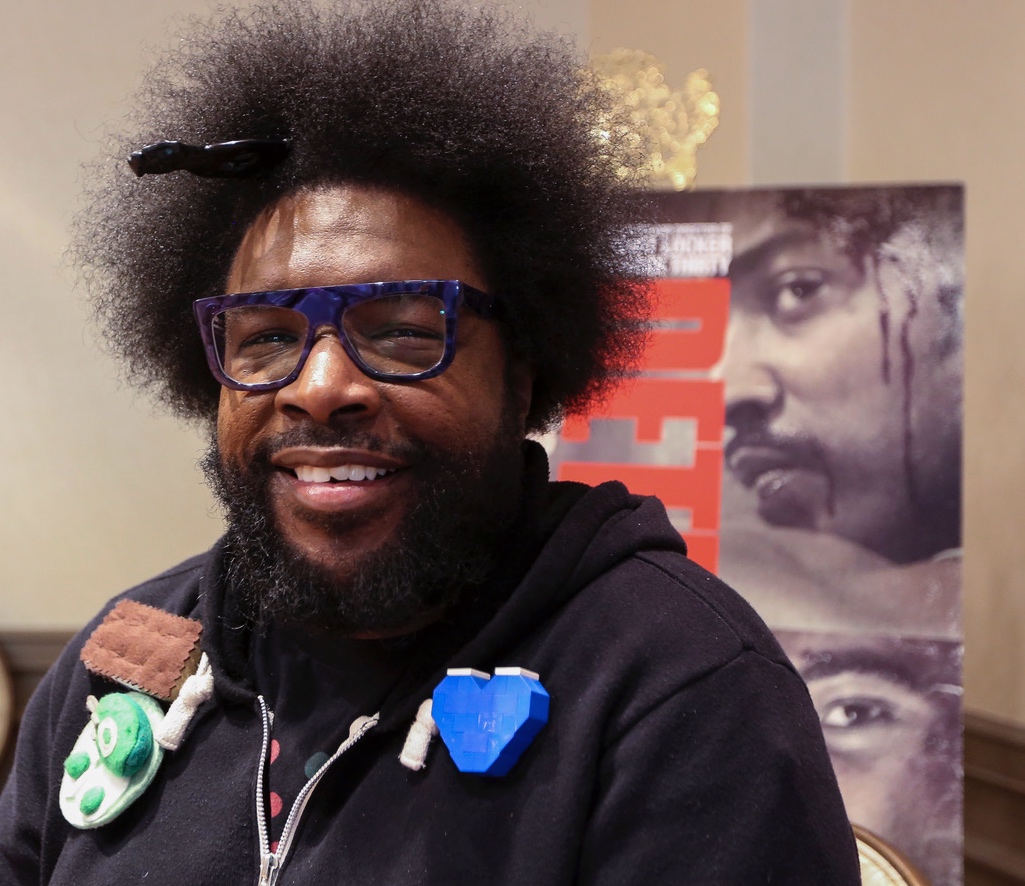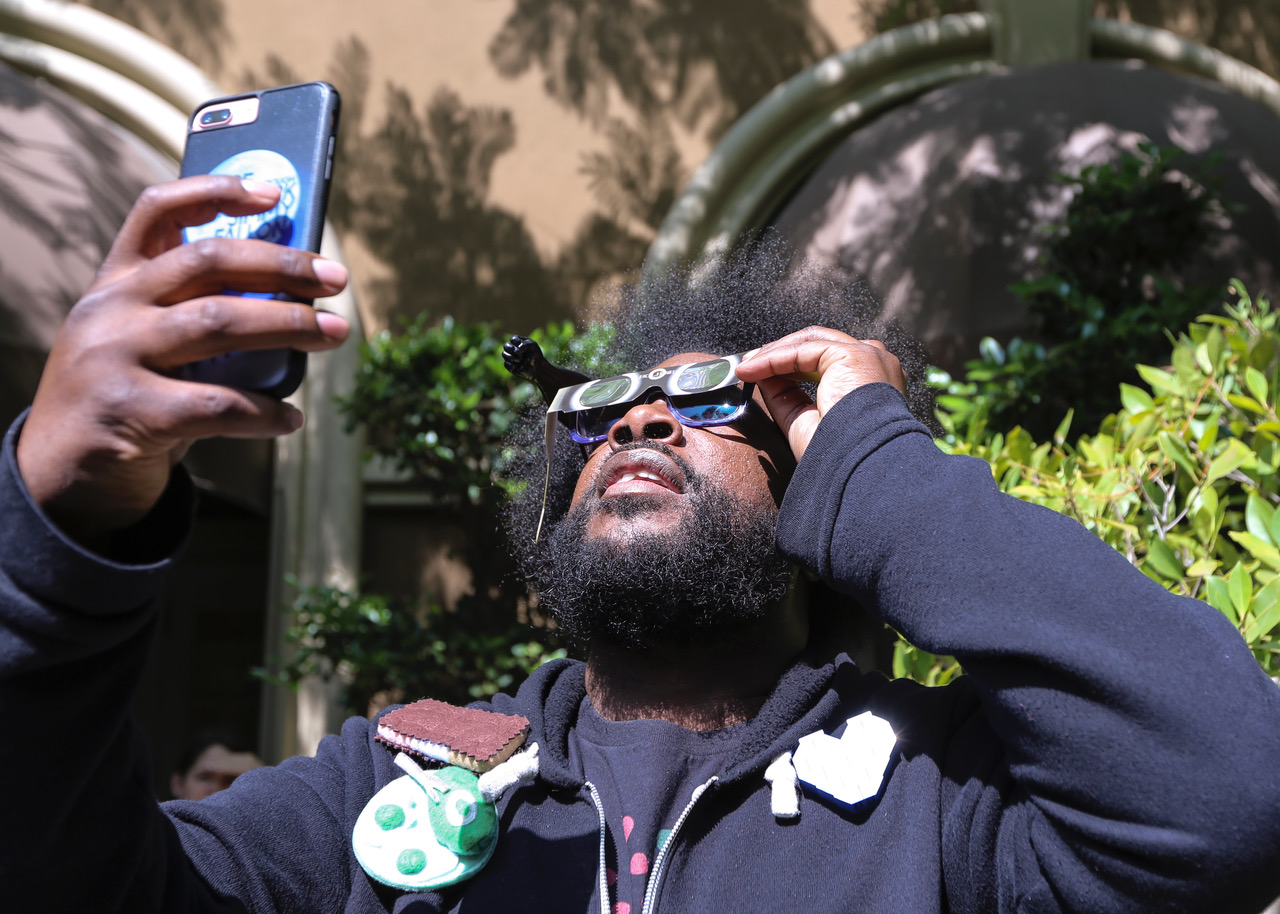
- Music
Questlove’s Whirlwind Year: From the Globes to Detroit
Drummer, DJ, producer, culinary entrepreneur, New York Times best-selling author, and member of The Roots, Questlove is the unmistakable heartbeat of Philadelphia’s most influential hip-hop group. He is the Musical Director for The Tonight Show Starring Jimmy Fallon, where his beloved Roots crew serves as the house band and joined Fallon on the Golden Globes stage last year lending his inimitable beat stylings to the proceedings before leading The Roots in a performance at the Amazon after party which has since become a legend.
Beyond all that, this four-time Grammy Award-winning musician’s indisputable reputation has landed him musical directing positions with everyone from D’Angelo to Eminem to Jay-Z. He also recently co-produced the Grammy Award-winning original Broadway cast recording of Hamilton, alongside Alex Lacamoire, Bill Sherman, Lin-Manuel Miranda, and Tarik ‘Black Thought’ Trotter. Questlove has also released two books including the New York Times bestseller Mo’ Meta Blues and Soul Train: The Music, Dance, and Style of a Generation.
We met him at the Four Seasons Hotel in Beverly Hills for a special project that is hitting the airwaves and cinemas around the world: the song It Ain’t Fair, that director Kathryn Bigelow asked him to write for her film Detroit, an intense look at the racial riots of 1967 in Detroit. As serendipity would have it we also met in a special moment: as the moon was covering the sun, a rare eclipse in the skies above California. And Questlove politely asked: “Can we go outside and check it out before the interview?” It was a cool moment to see the big man become content like a child.

What did Detroit mean to you before this film came to your attention?
Detroit holds a special place in my heart because a lot of the music that my genre represents is Detroit based. There’s a producer in Detroit named James Dilla Yancey whose group Slum Village was very crucial to the albums that I made 20 years ago. Voodoo by D’Angelo, Erykah Badu, all my records Mos Def like the whole movement that my sound represents was based in Detroit so I always had a soft spot in my heart for it because of the history of Detroit and because directly like one of my idols who’s no longer here J Dilla was from Detroit so…
And now comes a movie with that title. How did it happen?
I see this film and Kathryn Bigelow didn’t warn me of anything. She didn’t want to give me the history. She’s like ‘I just want you to watch it, tell me how you feel. If you’re interested could you give me a song?’ And watching it I see the Dramatics go through what they went through; it was just a whirlwind of emotions that I felt and, you know, we talked about it. She said that she wanted something soft and soothing. I told her that the movie made me angry and I need to put everything in the song. I needed therapy and as a result, you know, the song is 7 minutes long and it starts beautiful and it just goes into raging anger and I felt that was important because it’s rare that black people really get to express…
Especially after what happened to Larry Reed of the Dramatics after the Algiers Motel incident. He left and never performed again.
I felt we were expressing his anger and that to me was more important. I wanted to humanize and show the depth of emotions because black people rarely get a chance to express their emotions, you know, because usually, we have to be characters, kind of caricatures and really not show flesh and blood human side so for me it was important that we use our platform to express those emotions.
There are some strong, hard lines in the rap section.
Yeah, you know, we never talked about our emotions as a group. Usually, we just start jamming. Oh, that part’s good, that part’s good. We’d put the song together. This is the first time that we actually had a conversation like what do we want to express in this song and I said, I think there’s an audience we need to speak to and that audience is those that want to do something but are afraid to speak up and support because to take a stand sometimes it’s unpopular even when it’s the right thing. You know it’s the right thing, but you don’t want to rock the boat or disrupt the comfort that you have and for me, I knew that a lot of people would see this film and just wonder like – what can I do? And for me, this is appealing to their conscience and telling them that, this is going on, this is not 50 years ago, this is yesterday. This was last week in Charlottesville, you know what I mean. This is still going on so…
It’s incredible to think that this happened in Detroit in 1967. Usually, ’67 is associated with the Summer of Love in San Francisco or The Beatles’ Sgt. Pepper in London.
You thought it was about ‘Lovely Rita Meter Maid’ and someone’s catching me up but the thing is that I didn’t know like because when I went home to do my first question was, I was like is this a work of fiction or did this happen and then at one point I made them stop the film and I went up to the guy operating it, I said I have no history on this. I say is this the actual Dramatics like the ones that I know and he was like yeah and I was like whoa and I Google it quick and the Algiers Motel Incident came up and then I watched them and realized that I was watching, you know, the actual story so yeah, you know.
At the Golden Globes last year everybody was raving about the Amazon party and The Roots’ performance. Will we see you performing next January, the 75th Golden Globes?
Yeah, a lot actually came out of that performance. We were lucky enough to have meetings with the Amazon people afterward and we sort of solidified 3 production deals to develop. So we’re doing an animated series about our lives, a live-action series about our lives and we’re going to Dallas in October. We’re going to go to various opera houses and perform with orchestras so it’s weird. That one performance sort of blossomed into these development deals with Amazon so yeah; I hope I am there next year.
Who gave you the name Questlove?
Okay, so the short version is that I didn’t want a title. You know, in hip-hop you have to have a title so I just chose the question mark, but then every journalist kept calling me Mark. I was like why are you calling me Mark? They’re like a question mark and then about our third album, I shortened it to Questlove because love is like an old school last name so I figure that represents me.
And you always had this hairdo, with the comb in it?
I’ve had this hair all my life, yeah (laughing).

